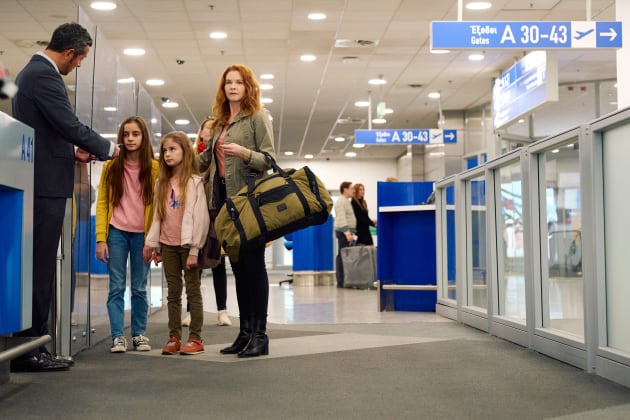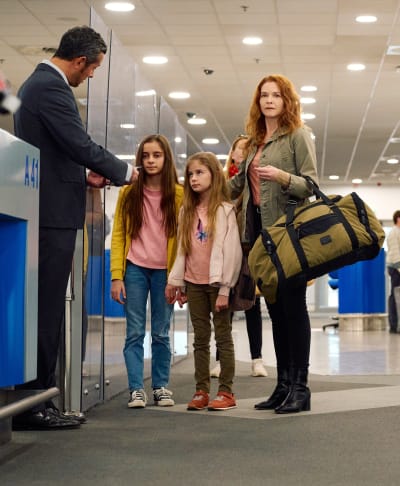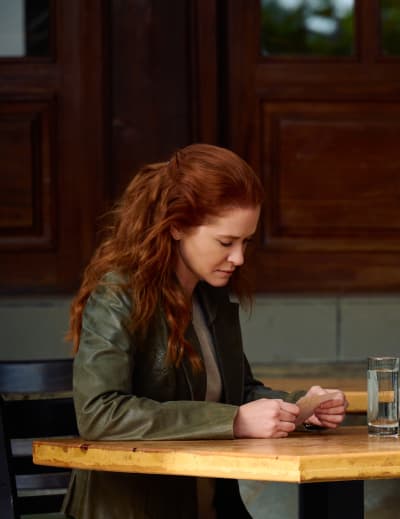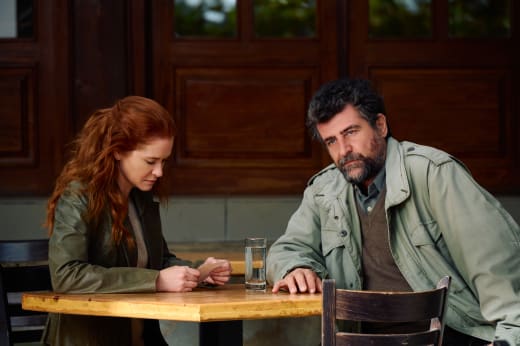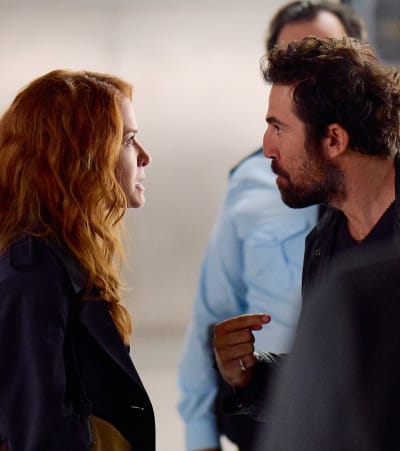Products You May Like
What a horrific tale!
Sarah Drew’s Lisbeth lived a mother’s worst nightmare during Stolen By Their Father — a ripped from the headlines film executive produced by Elizabeth Smart. Lisbeth’s heartrending ordeal to get her daughters back was almost unbearable to watch.
And the worst part about it all was knowing that actual events inspired the film.
In some ways, Stolen By Their Father felt like an ambitious movie for the network. We had Sarah Drew playing the titular character, and the film had her jettisoning from the States to Greece.
During a significant portion of the film, the gorgeous Greek backdrop was integral. You couldn’t capture the tone, and Lisbeth’s plight at this woman stuck in a foreign country, desperate, and not getting the proper aid she needed to protect her family.
They couldn’t have captured the level of intensity, helplessness, and outcast status Lisbeth experienced without the Greek location. The film is enriched because of the Greek casting and actual location. All of that added to the overall frustration and ire you felt while following Lisbeth’s experience.
Time and time again, we saw how much the system lets women like Lisbeth down, and it wasn’t in one country, but two.
As a domestic violence survivor, the entire film was just a plethora of people in Alaska and Greece, letting her down at every conceivable turn. And if it wasn’t bad enough that she was dismissed and treated poorly, they let her daughters down, too.
It seemed like Lisbeth was the only one who gave a damn about her children and what was in their best interest, and it was downright disturbing.
Greg was a vile creature; we knew as much because of their history, but his actions throughout the film got progressively worse, and it was hard to believe that his supposed charm was ever effective. Was there a time in the movie when he wasn’t an ass to people?
Because of how unapologetically dickish he was, it was upsetting that he ever succeeded in anything throughout the movie. It felt as though he was as transparent as it could get, so it was confusing that people either enabled him or bought into his actions and lies.
He didn’t appear to hide anything; Greg was brazen as hell about how much he enjoyed sticking it to Lisbeth, and there wasn’t a time when he didn’t present himself as a terrible man. Yet, he had the chief of police, judges, and others shrugging away his actions and volatile behavior and gaslighting Lisbeth.
At one point, people witnessed him slap her, and no one did anything about it.
For the entire film, it was Lisbeth begging people to help her and having to jump through hoops to prove that she was the reasonable person in this situation, and more often than not, it was all for naught.
It was enraging when she went to the American police, and the detective admitted that she didn’t take Lisbeth seriously because Greg told people that she was mentally unstable.
She was a detective, with access to all the police records and restraining orders in place. Because of that alone, Lisbeth deserved the benefit of the doubt, but not acknowledging her concerns in favor of taking Greg’s word wasted precious time.
It was similar in Greece, where Greg had more ground and pull, and it came across as if he had enough connections and an understanding of the legal system there that he kept worming his way around everything. Was Greece meant to come across as traditional and archaic?
Lisbeth’s status as an American worked against her while there, but much of that also had to do with her being a woman. It was like she was powerless, and everything was designed to work in Greg’s favor. No one wanted to consider that he was in the wrong for keeping his children because he was their father.
It didn’t seem to matter that they were divorced, he had a history of abuse, or that she had legal custody of the girls in the States. The law was supposed to protect her, but for whatever reason, it never did. It sure as hell didn’t do anything for the girls.
Months went by, and it was like no one cared to do anything. Did they expect Lisbeth to give up and stop looking for her kids? It was madness!
She went ten months with very little aid in getting her kids back, and if she didn’t have the few connections she managed through her work, how much worse would it have been?
It was as plain as day that Greg only did all of this to screw with Lisbeth. It was already bad enough that he kidnapped the girls and filled their heads with lies about their mother. But on top of all of that, he wasn’t even taking care of them.
Damn near a year later, she learned that they were bouncing around from place to place; he never had a steady job, the girls rarely went to school, and they were dirty and unkempt.
How could a judge know all these details and not determine that it was in the children’s best interest to be with their mother, who had been searching for them forever?
The judge heard that Greg was abusive to Lisbeth and knew the kids were rarely at school and weren’t living a stable life, but he still determined that moving them would be too much because they had already spent a year and a half in Greece.
It was heartbreaking when the girls revealed that he had been physically abusive to them.
My heart ached for Lisbeth, and Sarah Drew poured her all into this role, convincingly capturing Lisbeth’s relentlessness, fear, determination, and more. She was the clear star of this film because, for the most part, everyone else seemed to fall to the wayside.
Kimonas Kouris was serviceable as the villainous Greg, but it also felt like we didn’t get much to go on from his angle of things or see him in action until halfway through the film. He was very much capable of giving us so much more, but he oddly enough felt underused.
The private investigator stood out with time, but overall, this was Sarah Drew’s film to carry, and she certainly did that. I still wish the other characters didn’t fall into the background in a sea of forgetful names and faces.
The flashbacks also served to provide parallels from Lizbeth’s current situation, fighting to get her daughters back to her past as a kidnapped child whose terrible mother ripped her away from a loving father.
It wasn’t that the parallels didn’t make sense, but their frequency didn’t add very much to the film.
Lizbeth’s triumphant Uno reverse kidnapping to get her kids back was such a nerve-wracking scene, but it was satisfying when we got to that point. The build-up took so long, and then it flew by once it happened. But then goodness, she brought her babies back home.
It just saddens me how deeply multiple systems let her down, and as a domestic abuse survivor, she was no stranger to that as it was.
Over to you, Lifetime Fanatics. What are your thoughts about this film? Hit the comments!
Jasmine Blu is a senior staff writer for TV Fanatic. Follow her on Twitter.
